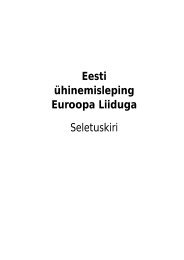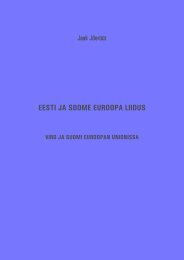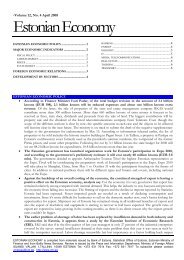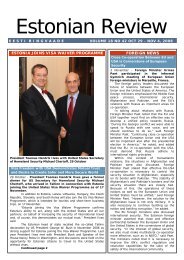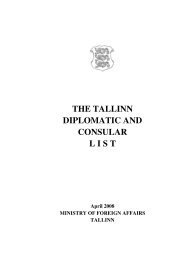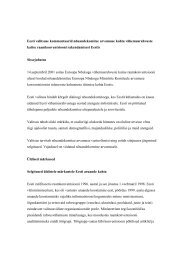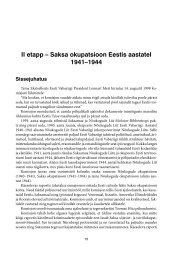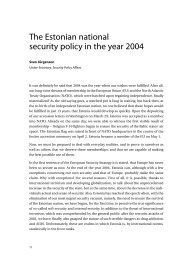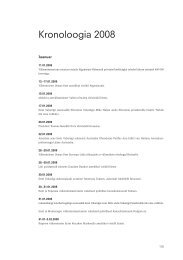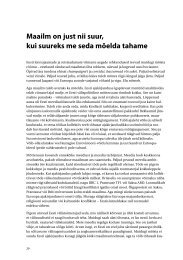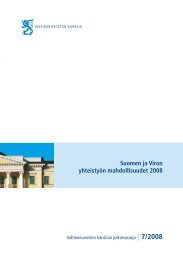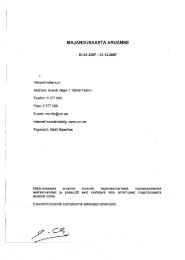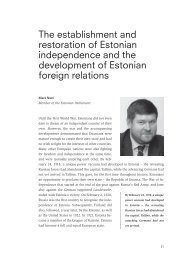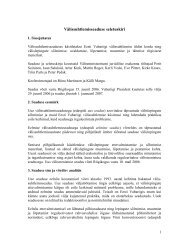Opportunities for Cooperation between Estonia and ... - Valitsus
Opportunities for Cooperation between Estonia and ... - Valitsus
Opportunities for Cooperation between Estonia and ... - Valitsus
Create successful ePaper yourself
Turn your PDF publications into a flip-book with our unique Google optimized e-Paper software.
The European Union has initiated a project to prepare a common maritime<br />
policy. It aims at improving the Union’s capabilities to respond to the challenges<br />
presented by globalization, competitiveness, climate change, pollution of<br />
the marine environment, maritime safety, energy security <strong>and</strong> sustainable<br />
development.<br />
At Sweden’s initiative, the European Union is currently preparing a Baltic<br />
Sea strategy, a process to which Finl<strong>and</strong> <strong>and</strong> <strong>Estonia</strong> have made a valuable<br />
contribution. One of the aims of the strategy is to define the main priorities<br />
of cooperation. Mostly likely, the strategy will be adopted during Sweden’s EU<br />
presidency in the latter half of 2009.<br />
Several other international organizations, projects <strong>and</strong> funds are involved, in<br />
one way or another, in the ef<strong>for</strong>ts to solve the environment problems affecting<br />
the Baltic Sea (ICES, EEIG, BONUS, Coalition Clean Baltic, Clean Baltic Sea<br />
Fund of John Nurminen Foundation, Baltic Sea Action Group, Baltic 21, etc.).<br />
The Gulf of Finl<strong>and</strong> is one of the most polluted areas of the Baltic Sea. <strong>Estonia</strong>,<br />
Finl<strong>and</strong> <strong>and</strong> Russia have engaged in research cooperation on the issues related<br />
to the Gulf <strong>for</strong> a long time. <strong>Estonia</strong> <strong>and</strong> Finl<strong>and</strong> have played a prominent<br />
part in the Bonus+ Baltic Sea Research Programme co-funded by the EU.<br />
Russia’s involvement in the research is of great importance to the success of<br />
the project.<br />
Although it is sometimes said that the Baltic Sea is the world’s most thoroughly<br />
researched sea, a number of current problems call <strong>for</strong> concentrated local ef<strong>for</strong>ts.<br />
The problems encountered on the Gulf of Finl<strong>and</strong> are exactly that. <strong>Estonia</strong><br />
<strong>and</strong> Finl<strong>and</strong> shoulder the main responsibility <strong>for</strong> ensuring that both countries<br />
have a comprehensive overview of the state of the Gulf <strong>and</strong> its evolution. In<br />
<strong>Estonia</strong> <strong>and</strong> Finl<strong>and</strong>, responsibility <strong>for</strong> marine research <strong>and</strong> maritime issues<br />
rests with several authorities, institutes <strong>and</strong> ministries. While ensuring greater<br />
coordination of the data, it is also important to make rational use of all the<br />
resources required <strong>for</strong> marine research.<br />
<strong>Estonia</strong>’s <strong>and</strong> Finl<strong>and</strong>’s common interests regarding the Gulf of Finl<strong>and</strong> are<br />
multi-faceted ranging from the safety of shipping to environmental protection<br />
<strong>and</strong> security issues. Advocating these shared interests calls <strong>for</strong> coordinated<br />
cooperation <strong>and</strong> the continuous exchange of in<strong>for</strong>mation <strong>between</strong> the<br />
competent authorities <strong>and</strong> institutions of the two countries.<br />
38



